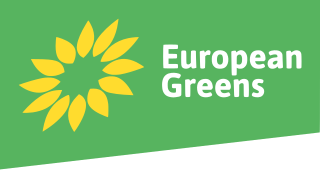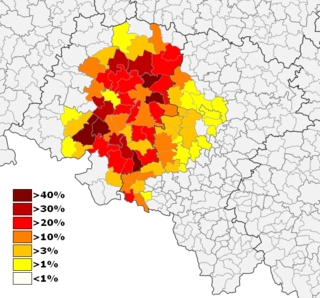
The European Green Party (EGP), also referred to as European Greens, is the European political party that represents national parties from across Europe who share Green values. The European Greens works closely with the Greens–European Free Alliance (Greens/EFA) parliamentary group in the European Parliament which is formed by elected Green party members along with the European Free Alliance, European Pirate Party and Volt Europa. The European Greens' partners include its youth wing the Federation of Young European Greens (FYEG), the Green European Foundation (GEF) and the Global Greens family.

Dariusz Szwed is a Polish politician, feminist, activist and expert on green economy and sustainable development. He is one of the trustees of the Green Institute Foundation and the chair of its Programme Council.

Parliamentary elections were held in Poland on 21 October 2007, after the Sejm voted for its own dissolution on 7 September. The election took place two years before the maximum tenure of four years, with the previous elections having been in September 2005. The early elections were a result of serious allegations of massive corruption on the part of Andrzej Lepper, leader of the Self-Defense of the Republic of Poland, whose party served as a junior coalition partner to the government of Prime Minister Jarosław Kaczyński. All 460 seats in the Sejm and all 100 seats in the Senate were up for election.

National Party of Retirees and Pensioners is a minor left-wing political party in Poland. The main goal of KPEiR is protecting retired seniors, pensioners and trust-busting. The current leader is former Sejm Member Tomasz Mamiński.

The Party of Regions was a left-wing Polish non-parliamentary political party created in November 2007 and registered in February 2008. The Party of Regions was created by former members of Self-Defence and the Democratic Left Alliance after the parliamentary election in 2007, when Self-Defence support collapsed to far less than the 5% electoral threshold giving them no seats in the new legislature. Founders of the grouping included Krzysztof Filipek, Danuta Hojarska and Bolesław Borysiuk. For failure to disclose their financial records for the year 2015, they were struck off in early 2017.

The 2014 European Parliament election in Poland elected the delegation from Poland to the European Parliament. It took place on 25 May 2014. The Polish electorate will elect 51 MEPs, compared to 50 in the 2009 election.. The number of MEPs is a result of the 2013 reapportionment of seats in the European Parliament. This means that Poland will have 6% of the total seats in the European Parliament.

The German Minority Electoral Committee is an electoral committee in Poland which represents the German minority. Since 2008, its representative has been Ryszard Galla. In the 2023 Polish parliamentary election, Galla lost his seat in the Sejm, leaving the party with no national representation.
Adam Edward Ostolski is a Polish sociologist, columnist and activist. He is a member of the Krytyka Polityczna and a member of the editorial board of the Green European Journal. In 2013-2016 he was co-leader of the Poland's Green Party.
The Polish Communist Party, or the Communist Party of Poland, is an anti-revisionist Marxist–Leninist communist party in Poland founded in 2002 claiming to be the historical and ideological heir of the Communist Party of Poland, Polish Workers' Party and the Polish United Workers' Party.

The New Hope is a right-wing political party in Poland. It is currently led by Sławomir Mentzen.
Kukiz'15 is a right-wing populist political party in Poland led by Paweł Kukiz.

Left Together is a left-wing political party in Poland.

The Union of European Democrats is a liberal political party in Poland. It is led by Elżbieta Bińczycka.

The Agreement, formally known as Jarosław Gowin's Agreement, is a centre-right political party in Poland.
The United Right was a parliamentary group formed by Jarosław Gowin and Zbigniew Ziobro with their respective parties, Poland Together and United Poland. After their cooperation at 2015 Polish parliamentary election with the Law and Justice party, 'United Right' became a media label for the ruling right-wing political alliance of Law and Justice with its aforementioned partners in Poland.
The Civic Coalition is a catch-all political alliance currently ruling in Poland. The alliance was formed around Civic Platform in opposition to the then-ruling Law and Justice (PiS) party.

The European Coalition was a short-lived electoral alliance and list in Poland. It was established on the verge of 2019 European Parliament election by a group of former prime ministers and former foreign ministers, including Jerzy Buzek, Ewa Kopacz, Grzegorz Schetyna and Radosław Sikorski. They declared the will to construct "one broad list in European Parliament election, the aim of which would be to restore Poland's strong position in the European Union". The Coalition is to be pro-European and centrist.

On Sunday 26 May 2019, a vote was held to elect the Polish delegation to the European Parliament. Polish voters elected 52 MEPs, compared to 51 in the 2014 election. The increased number of MEPs is a result of the 2018 reapportionment of seats in the European Parliament. Following the United Kingdom's announcement, that it will participate in elections to the European Parliament on May 23, Poland will continue to be represented by 51 MEPs. The 52nd MEP will take up their mandate immediately after the UK leaves the European Union. Following the announcement of the election results, the National Electoral Commission indicated Dominik Tarczyński from Lesser Poland and Świętokrzyskie will take up the 52nd seat.

The Polish Initiative is a progressive political party in Poland. It was formed as an association in 2016, and was registered as a political party in 2019. Its leader is Barbara Nowacka, and it is a part of the Civic Coalition. It supports principles of social liberalism, social democracy and secularism. It has been described as centre-left.
The Alternative Social Movement was coalition of Polish political parties formed on 18 March 2001 in Warsaw for the 2001 Polish parliamentary election. The grouping was formed from a merger of Confederation of Independent Poland - Patriotic Camp led by Michał Janiszewski, Tomasz Karwowski, and Janina Kraus, together with a group of politicians originating from the Christian National Union (ZChN), including Henryk Goryszewski and Mariusz Olszewski. The coalition was also joined by the Free Trade Union 'August 80' Confederation, led by Daniel Podrzycki and Bogusław Ziętek. The Alternative Social Movement was registered as a political party, and its members mainly became the activists of August 80.

















